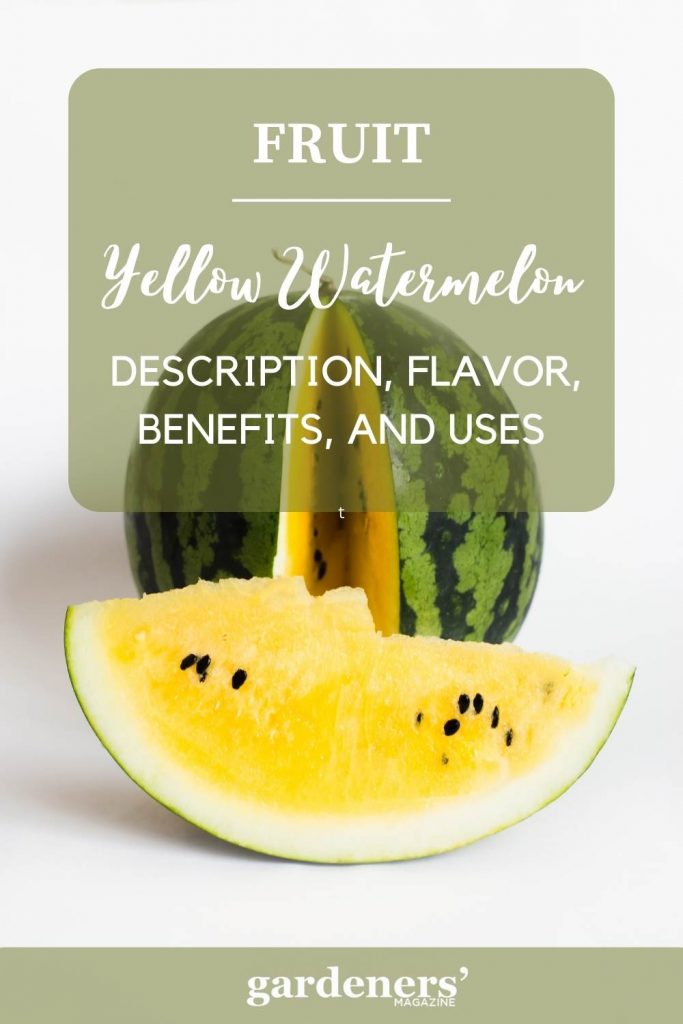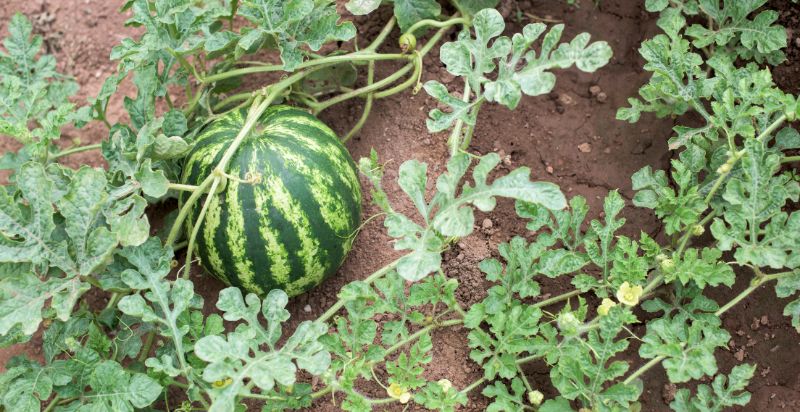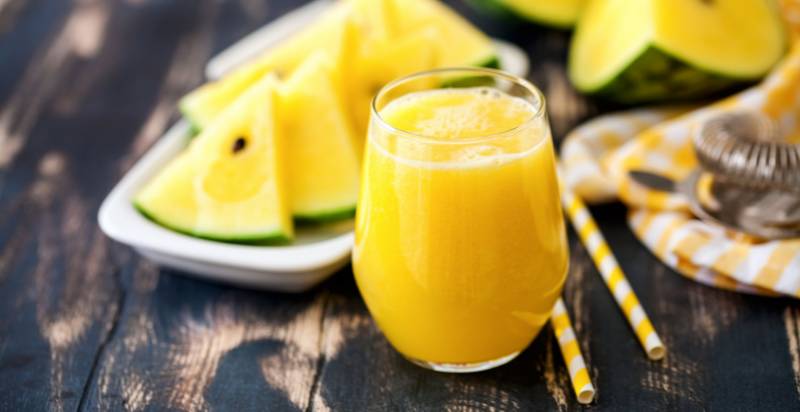Yellow Watermelon is an increasingly popular variety with bright yellow flesh and yellow-green rind. It is said to have originated in the Southern United States, although it is now grown worldwide. While many people are familiar with the classic red-fleshed watermelons, they may need to be made aware of the unique flavor and nutritional benefits of yellow watermelon. Here is everything you wanted to know about yellow watermelon.
What is Yellow Watermelon?
Yellow watermelon is a variety of watermelon with yellow flesh and yellow-green rind. The yellow flesh has a sweet, tart flavor similar to red watermelons but slightly milder. Yellow watermelons contain more sugar than other watermelon varieties, making them the perfect choice for a sweeter treat.

History and Origin of the Yellow Watermelon
The origin of the yellow watermelon dates back to the 19th century. It was first discovered in Japan, where it is believed to have been cultivated by farmers. Yellow watermelons are also closely related to their orange-fleshed cousin, cantaloupes.
The development of yellow watermelons is largely attributed to the work of Japanese botanist and horticulturist Dr. Umetaro Azechi. During the early 1900s, he had been researching and experimenting with different watermelon varieties in search of a new, sweeter type of melon. His efforts resulted in the discovery and cultivation of the yellow-fleshed fruit.
Yellow watermelons were originally grown in Japan, and their popularity spread to other parts of Asia and eventually to the United States. Today, yellow watermelons are widely available in supermarkets across the country. They can be found in both seedless and seeded varieties, although the seedless types are more popular.
Health Benefits of the Yellow Watermelon
The yellow watermelon is a powerhouse of vitamins and minerals, making it an ideal choice for those looking to get the most out of their diet. A cup of this fruit provides more than a day’s worth of vitamin C and other essential nutrients like zinc and potassium.
Additionally, the yellow watermelon is low in calories but contains a good amount of fiber, helping to keep you full and satisfied. Its high levels of lycopene, an antioxidant that helps protect against cancer and heart disease, make it a great choice for anyone looking to improve their health. Yellow watermelon is rich in antioxidants that help reduce inflammation, promote better skin health, and boost your immune system. These benefits make this bright and sweet fruit an excellent choice for anyone looking to improve their health.
Flavor Profile of the Yellow Watermelon
The yellow watermelon has a sweet, crisp taste with hints of honey. It is less juicy and has a slightly crunchy texture than the red variety. The flavor is often described as reminiscent of honeydew melon or cantaloupe.
While it can be eaten fresh, many chefs prefer to use the yellow watermelon in salads or as a garnish for other dishes because of its mild, sweet flavor. It can also be cooked in many different ways and makes an excellent addition to smoothies and sorbets. Its subtle sweetness pairs well with honey, ginger, lime, mint, and basil. Its bright yellow color adds a unique aesthetic touch to any dish.
Nutritional Comparison of Yellow Watermelon with Red Watermelon
Both red and yellow watermelons are not only delicious but also packed with essential nutrients. Let’s dive into the details of how these two varieties differ in terms of their nutritional composition.
| Nutrient/Compound | Red Watermelon | Yellow Watermelon |
| Lycopene | Rich in lycopene, which is a potent antioxidant | Not as rich in lycopene as red watermelon |
| Beta-Carotene | Contains beta-carotene, which gives it a yellow hue | Contains higher levels of beta-carotene compared to red watermelon |
| Fiber | Rich in fiber | Rich in fiber |
| Natural Sugar | One cup (approximately 152 grams) contains 9.42 grams of natural sugar | One cup (approximately 152 grams) contains 11.5 grams of natural sugar |
| Minerals | Rich in minerals like potassium and magnesium | Similar mineral content, including potassium and magnesium |
| Vitamin C | Contains vitamin C, but not as much as yellow watermelon | High in vitamin C |
Gardening Tips for Growing Yellow Watermelons

If you would like to grow yellow watermelons, here are some important tips that you can follow:
- Growth Zones:
- Yellow watermelon can thrive in a wide range of climates, encompassing Zones 3 to 12.
- Sunlight:
- They require a significant amount of sunlight, preferably 8 to 10 hours per day. In hotter climates, providing partial sun can help protect the plants from the intense afternoon sun.
- Soil Preference:
- It thrives in loamy soil that is rich in organic matter, which retains moisture while ensuring proper drainage to prevent root rot. In rainy climates, watering is advised only during droughts or when the top 2 inches of soil become dry to avoid overwatering.
- Spacing:
- The plant rows should be spaced 6 to 8 feet apart, with individual plants within the row spaced 4 feet apart. Additionally, it recommends creating mounds that are 6 to 8 inches high and 3 feet wide for planting.
- Watering:
- Water the plants when the top 2 inches of soil are dry to prevent root rot. This watering method should be maintained consistently, especially during fruit development.
- Fertilization:
- Fertilize the soil before planting the seeds to provide essential nutrients. Afterward, no additional fertilization is needed, implying that the initial fertilization should be sufficient for the plant’s growth.
- Lifecycle:
- Yellow watermelon is an annual plant, meaning it completes its lifecycle within one year. Therefore, it needs to be reseeded each year to produce new fruit.
- Climate/Hardiness:
- Yellow watermelon is not cold hardy, which means it cannot tolerate frost or cold temperatures. Instead, it thrives in warm and hot climates.
- Harvest/Propagation:
- The fruit can typically be harvested between 70 and 100 days after planting, though timing may vary depending on the climate. Additionally, it provides indicators of fruit readiness for harvest, such as the skin’s dark green color and the tendril turning brown.
Where are Yellow Watermelons Grown and Harvested?
Yellow watermelon is primarily grown and harvested in the warmer climates of Florida, California, Texas, Mexico, and South America. The melons require a lot of heat to develop their sweet flavor and beautiful yellow color.
They are planted in late spring or early summer after the danger of frost has passed and are then ready for harvest anywhere from two to four months later. In the United States, the growing season usually runs from May through October, with peak production occurring during July and August.
Where to Find the Best Quality Yellow Watermelon?
Shopping for good quality yellow watermelon can be tricky, but there are a few key factors you should look for: color, shape, and firmness. Start by looking for fruit with an even golden-yellow hue throughout and free of spots or bruises. The shape should be oval and plump, not overly flat or oblong. Pressing your finger into the melon should give slightly but still be firm to the touch.
The best place to find high-quality yellow watermelons is at a local farmer’s market or produce stand. Here, you can often find freshly picked fruit and talk directly to the grower about their harvest. Support your community and help sustain local farms by shopping for yellow watermelon at these markets. You can also find some good quality yellow watermelon in most large grocery stores or specialty fruit stands. Inspect the melon before you buy—the same factors apply here. Check the melon’s color, shape, and firmness, and avoid buying any with spots or bruises.
Finally, keep an eye out for online sellers that specialize in yellow watermelon. Many farmers now offer their high-quality harvests for sale online, which can be a great way to stock up on your favorite fruit! Read reviews before committing to any purchase to know you’re getting a top-notch product.
How to Store Yellow Watermelon?
Storing yellow watermelon is easy, but you must take a few steps to ensure it is done properly. Before storing, ensure the watermelon is completely ripe by inspecting it for bruises or soft spots. Soft spots indicate that the watermelon is still being prepared and should only be stored once it is fully ripened.
Once the watermelon is ripe, please place it in a cool, dark spot in your kitchen or pantry. If you’re storing several yellow watermelons, stack them with one another so they don’t get damaged. Try to keep them elevated off the ground as much as possible to avoid any excess moisture build-up that could cause mold to develop on the watermelons.
If you plan to store your yellow watermelon for a long time, wrap it in plastic and place it in the refrigerator. This will help keep it fresh and prevent any spoilage. Check-in with your watermelon every few days to ensure no signs of mold or decay. If you want to store the yellow watermelon briefly, place it on the counter at room temperature and cover it loosely with a light cloth. This will help keep out any dust or dirt particles accumulating over time. Make sure to check in with your watermelon every day to make sure it’s still ripe and ready to enjoy.
How to Use Yellow Watermelon in Recipes?
Yellow watermelon can be used in various recipes, from sweet to savory. Here are some culinary ideas on how to use yellow watermelon in your cooking:
- Add it to summer salads for a refreshing twist. Slice the yellow watermelon into cubes and combine it with other summer vegetables such as cucumbers, tomatoes, and red onions. Dress with a light vinaigrette.
- Use yellow watermelon to make smoothies or sorbets. For a refreshing sweet treat, blend it with other fruits, such as strawberries and bananas.
- Grill slices of the yellow watermelon on a hot grill and top with cheese, tomatoes, and fresh herbs for a unique summer side dish.
- Make a savory salsa by combining diced yellow watermelon with chopped red onion, cilantro, jalapeno pepper, and lime juice. Serve it as an accompaniment to grilled meats or tacos.
- Prepare a sweet and spicy stir-fry by combining jasmine rice, diced yellow watermelon, bell pepper, garlic, ginger, and chili flakes. Serve it over steamed vegetables or a bed of lettuce for a light lunch.

Conclusion
Whether you pick up a yellow watermelon at the store or grow it in your backyard, it is sure to be a crowd-pleaser. Its sweet flavor and bright color make it a great addition to salads, smoothies, stir-fries, and more. Be sure to take the time to inspect and store the watermelon before you enjoy it properly. With just a few simple steps, you can extend its shelf life and savor its unique flavor for days.
If you want to try growing something unique, our article on Zucchino Rampicante Squash is a must-read. It’s all about this extraordinary variety and how to incorporate it into your dishes.
Frequently Asked Questions:
Is Yellow Watermelon Healthier than Red Watermelon?
Yellow watermelon is a fantastic source of the antioxidant beta-carotene, surpassing even the red watermelon. Beta-carotene has been linked to potential protection against both cancer and eye disease. Enjoy the benefits of yellow watermelon by incorporating it into refreshing fruit salads, attractive platters, and delectable desserts. Feel free to indulge in enticing smoothies and invigorating juices made with this vibrant and nutritious fruit.
Do Yellow and Pink Watermelon Taste the Same?
Yellow watermelon, with its vibrant yellow flesh, is just as delightful as its pink counterparts. These watermelons feature tough, green rinds and possess a similar texture and flavor. However, what sets yellow watermelons apart is their enticing hint of extra sweetness.
Can you Buy Yellow Watermelon in the US?
Finding yellow watermelon can be a bit challenging, unlike the more common pink watermelon. Consider exploring your local supermarket—Trader Joe’s, in particular, tends to carry yellow watermelons during the summertime. Additionally, check out specialty fruit shops and your nearby farmers market when the warm months roll around.
- Everything You Wanted to Know About Red Tamarillos - June 2, 2025
- A Guide to Tulips: Everything You Need to Know & More… - June 2, 2025
- Guanabana: Description, Flavor, Benefits, And Uses - May 27, 2025

2 thoughts on “Yellow Watermelon: Description, Flavor, Benefits, And Uses”
Comments are closed.